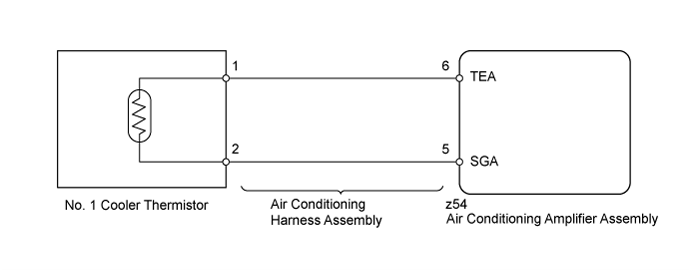Dtc B1413 Evaporator Temperature Sensor Circuit
DESCRIPTION
WIRING DIAGRAM
INSPECTION PROCEDURE
READ VALUE USING INTELLIGENT TESTER (EVAPORATOR FIN THERMISTOR)
INSPECT NO. 1 COOLER THERMISTOR
INSPECT AIR CONDITIONING HARNESS ASSEMBLY
DTC B1413 Evaporator Temperature Sensor Circuit |
DESCRIPTION
The No. 1 cooler thermistor is installed on the evaporator in the air conditioner unit to detect the cooled air temperature that has passed through the evaporator and control the air conditioning. It sends appropriate signals to the air conditioning amplifier assembly. The resistance of the No. 1 cooler thermistor changes in accordance with the cooled air temperature that has passed through the evaporator. As the temperature decreases, the resistance increases. As the temperature increases, the resistance decreases.The air conditioning amplifier assembly applies voltage (5 V) to the No. 1 cooler thermistor and reads voltage changes as the resistance of the No. 1 cooler thermistor changes. This sensor is used for frost prevention.DTC Code
| DTC Detection Condition
| Trouble Area
|
B1413
| An open or short in the No. 1 cooler thermistor circuit is detected for 8.5 minutes or more.
| - No. 1 cooler thermistor
- Air conditioning harness assembly
- Air conditioning amplifier assembly
|
WIRING DIAGRAM
INSPECTION PROCEDURE
| 1.READ VALUE USING INTELLIGENT TESTER (EVAPORATOR FIN THERMISTOR) |
Use the Data List to check if the No. 1 cooler thermistor is functioning properly (Click here).
Air ConditionerTester Display
| Measurement Item/Range
| Normal Condition
| Diagnostic Note
|
Evaporator Fin Thermistor
| No. 1 cooler thermistor /
Min.: -29.7°C (-21.46°F)
Max.: 59.55°C (139.19°F)
| Actual evaporator temperature displayed
| Open in the circuit: -29.7°C (-21.46°F).
Short in the circuit: 59.55°C (139.19°F).
|
- OK:
- The display is as specified in the normal condition.
ResultResult
| Proceed to
|
OK (When troubleshooting according to problem symptoms table)
| A
|
OK (When troubleshooting according to the DTC)
| B
|
NG
| C
|
| | REPLACE AIR CONDITIONING AMPLIFIER ASSEMBLY (Click here) |
|
|
| |
|
| A |
|
|
|
| PROCEED TO NEXT INSPECTION PROCEDURE SHOWN IN PROBLEM SYMPTOMS TABLE (Click here) |
|
| 2.INSPECT NO. 1 COOLER THERMISTOR |
Remove the No. 1 cooler thermistor.
- for LHD: Click here.
- for RHD: Click here.
Measure the resistance according to the value(s) in the table below.
- Standard Resistance:
Tester Connection
| Condition
| Specified Condition
|
1 - 2
| -10°C (14°F)
| 7.30 to 9.10 kΩ
|
-5°C (23°F)
| 5.65 to 6.95 kΩ
|
0°C (32°F)
| 4.40 to 5.35 kΩ
|
5°C (41°F)
| 3.40 to 4.15 kΩ
|
10°C (50°F)
| 2.70 to 3.25 kΩ
|
15°C (59°F)
| 2.14 to 2.58 kΩ
|
20°C (68°F)
| 1.71 to 2.05 kΩ
|
25°C (77°F)
| 1.38 to 1.64 kΩ
|
30°C (86°F)
| 1.11 to 1.32 kΩ
|
- NOTICE:
- Even slightly touching the sensor may change the resistance value. Be sure to hold the connector of the sensor.
- When measuring, the sensor temperature must be the same as the ambient temperature.
- HINT:
- As the temperature increases, the resistance decreases (see the graph).
Text in Illustration*a
| Sensor
|
*b
| Resistance
|
*c
| Allowable Range
|
*d
| Temperature
|
ResultResult
| Proceed to
|
OK
| A
|
NG (for LHD)
| B
|
NG (for RHD)
| C
|
| 3.INSPECT AIR CONDITIONING HARNESS ASSEMBLY |
Remove the air conditioning harness assembly.
- for LHD: Click here.
- for RHD: Click here.
Measure the resistance according to the value(s) in the table below.
- Standard Resistance:
Tester Connection
| Condition
| Specified Condition
|
z54-6 (TEA) - 2
| Always
| Below 1 Ω
|
z54-5 (SGA) - 1
| Always
| Below 1 Ω
|
z54-6 (TEA) - Body ground
| Always
| 10 kΩ or higher
|
z54-5 (SGA) - Body ground
| Always
| 10 kΩ or higher
|
Text in Illustration*a
| Front view of wire harness connector
(to No. 1 Cooler Thermistor)
|
*b
| Front view of wire harness connector
(to Air Conditioning Amplifier Assembly)
|
ResultResult
| Proceed to
|
OK
| A
|
NG (for LHD)
| B
|
NG (for RHD)
| C
|
| | REPLACE AIR CONDITIONING HARNESS ASSEMBLY (Click here) |
|
|
| | REPLACE AIR CONDITIONING HARNESS ASSEMBLY (Click here) |
|
|
| A |
|
|
|
| REPLACE AIR CONDITIONING AMPLIFIER ASSEMBLY (Click here) |
|


